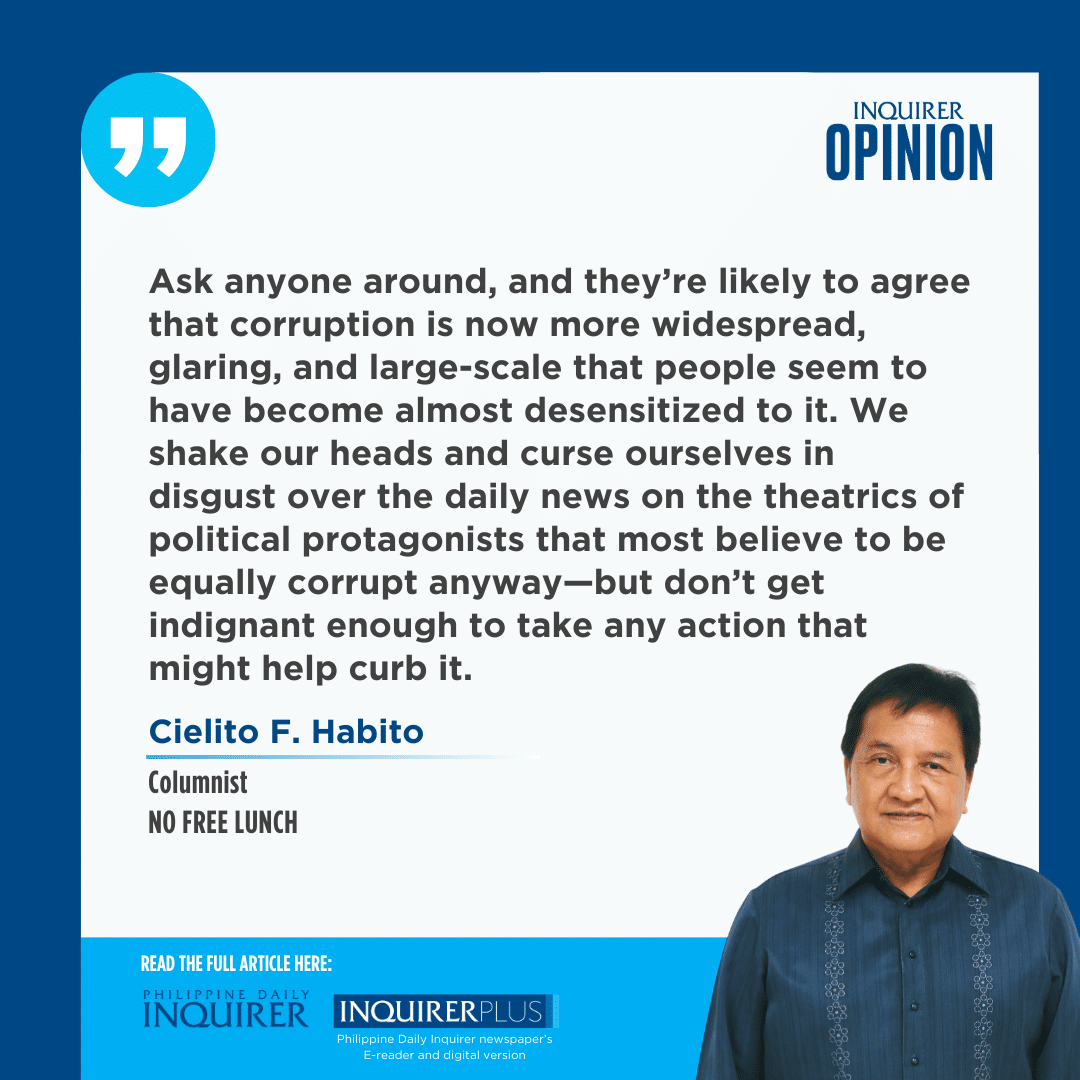Losing hope on corruption
We hear the word talamak increasingly being used to describe corruption in our midst. Its dictionary translations into “chronic,” “acute,” or “rampant” don’t quite capture the intensity and brazenness the word is intended to convey in this context. Ask anyone around, and they’re likely to agree that corruption is now more widespread, glaring, and large-scale that people seem to have become almost desensitized to it. We shake our heads and curse ourselves in disgust over the daily news on the theatrics of political protagonists that most believe to be equally corrupt anyway—but don’t get indignant enough to take any action that might help curb it. We get a sinking feeling that things have gotten out of hand, and nothing any of us can do can stop it.
And yet we all know that systemic corruption has long held back our economic progress and kept us from achieving sustained economic development as Singapore, Malaysia, Vietnam, and Thailand did. It dampens job-creating domestic and foreign investments, and has kept many Filipinos trapped in poverty. It has diverted public funds from essential infrastructure for corrupt officials’ private gain. Infrastructure projects are overpriced, delayed, or exist only on paper, awarded to spurious contractors often owned by the very politicians who allocate the funds for them.
In the Napoles-style schemes of the past, spurious nongovernment organizations were the tools employed to siphon off tens to hundreds of millions of pesos of pork barrel funds into politicians’ pockets. That is now small change compared to billions awarded to politicians’ own contractor firms from hundreds of billions in flood control and other infrastructure budgets. While our neighbors put in place modern infrastructure facilities that attracted foreign investors and enhanced trade, we’re still cursing unbearable traffic congestion, lack of public transport, persistent damaging floods, and poor connectivity.
Corruption drives up our costs of doing business, as companies must pay substantial unofficial fees and navigate a complex web of bureaucratic hurdles, making them less competitive in regional and global markets. It leads to policy decisions that prioritize officials’ short-term gains over long-term national interests and the greater good. Inconsistent policies and lack of continuity in government programs further hinder economic progress. Meanwhile, neighbors like Vietnam pursued deliberate reforms to curb corruption and create business-friendly environments, which led them to rapid economic growth. Stable and transparent policies in our neighbors have been able to attract sustained investments and implement long-term development strategies.
Corruption undermines the effectiveness of government institutions, resulting in poor service delivery and weak enforcement of laws. Our courts are often perceived as susceptible to political influence and bribery, leading to delayed or biased rulings that have eroded public trust and businesses’ faith in the legal system to resolve disputes. In contrast, strong institutions in our Asean peers ensure accountability, transparency, and efficient governance, which have fostered faster economic development.
Corruption worsens poverty by depriving millions of Filipinos of access to education, health care, and social welfare. This creates a vicious cycle where poverty fuels corruption, with desperate individuals only too willing to sell their votes and elect openly corrupt officials. And corruption perpetuates inequality by allowing wealth and power to be concentrated among a few elites. The disparity between the wealthy who enjoy lavish lifestyles and the poor struggling to make ends meet is particularly stark in the Philippines. Neighboring countries with lower levels of corruption, such as Vietnam and Thailand, have managed to reduce inequality and create more inclusive societies.
So what could we do, other than shrugging our shoulders and giving up? Vietnam strengthened laws on asset declarations, transparency, and enforcement mechanisms, and expanded the definition of conflicts of interest. Their “Blazing Furnace” anti-corruption campaign has ousted two presidents and several deputy ministers, and disciplined thousands of officials, including senior leaders, military generals, and party members. They have harnessed digital tools to enhance transparency and reduce corruption opportunities in public administration and procurement processes. They also promoted public participation in anti-corruption initiatives, especially youth and civil society organizations. But all these won’t happen without the top leadership enabling them, like the Communist Party in Vietnam does. Can we elect a president who will again proclaim “Kung walang corrupt, walang mahirap,” and really take the mission to heart?
—————
cielito.habito@gmail.com

















